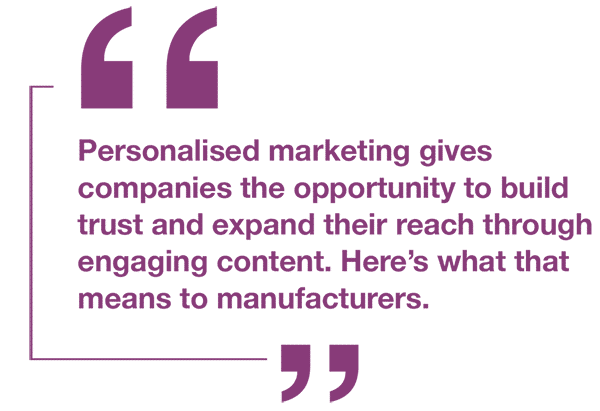Beyond a name
The importance of personalised marketing in manufacturing
In the early days of digital media, forward-thinking marketing teams were quick to jump on the opportunity to reach enormous audiences at very little cost. Then, along came automation to increase brand reach at low cost and massive scale.
However, these two developments ultimately resulted in a huge spike in mass marketing for brands. The problem with mass marketing is that it completely ignores audience segmentation and lacks adaptability, which means it is really only effective for products with general appeal and sold at low prices. For most manufacturers, such as those that cater to quality-conscious customers in the retail or B2B space, this is far from ideal, since it does little to build trust and form lasting customer relationships.


The return and rise of personalised marketing
Personalised marketing is nothing new. Indeed, it has long been a staple in many industries for years, especially those that handle high-value transactions and where trust, relevance, and customer satisfaction are essential to success. However, in the context of digital marketing, it has taken on a wholly new meaning that goes far beyond just adding a name to your email newsletters or spending a bit of time tweaking the targeting options on social media advertising platforms.
Both the challenge of and the need for personalised marketing are born of the fact that every customer is different. Trying to communicate to everyone in the same way may be the cheaper and easier option, but such an approach only dilutes the power of your message. This applies to businesses in any industry, including primarily B2B sectors like manufacturing. In fact, B2B manufacturing firms have it even tougher than most, because they typically involve high-value, high-volume transactions where customers tend to take extra care before committing.
To attract customers in such an environment, manufacturers need to build trust and offer an impeccable service. Personalised marketing, which has now become an inseparable part of the entire customer experience, is paramount to that. In the manufacturing space, this typically takes the form of account-based marketing, whereby marketing and sales reps engage directly with prospects and customers to deliver a more engaging and relevant experience. As such, their primary goal is not to increase sales directly, but to do so indirectly by ensuring that their customers have an impeccable experience when dealing with them.
Personalised marketing depends on an optimal combination of technology and human impact. Technology assists with the collection of data-driven insights to drive more informed decision-making. Humans focus on tailoring content and strategies to specific audience personas, while engaging sales prospects directly. Such an approach can be highly effective for manufacturing firms, which are typically highly reliant on long-term customer relationships.
Building trust with high-value prospects and customers through personalised content
Customer experience and personalised marketing are two terms one rarely hears about in the context of manufacturing. After all, manufacturing has traditionally been focussed on products rather than how they are presented to customers, with little being invested outside of research and development.
The problem with too much automation, especially in the case of mass marketing, is that it can depersonalise a brand, and a depersonalised brand is one that customers are less likely to trust.
Given that many manufacturers rely on high-volume, high-value sales, earning customer trust needs to be a top priority. The greater the effort sales and marketing teams make to address people’s unique needs and emotions, the easier it will be for them to connect with customers on a meaningful level. This, in turn, fosters more personal relationships which, once established, cultivate trust and customer loyalty.
Building those relationships and inspiring trust starts with personalised marketing and digital content created and curated for a clearly defined target audience. When it comes to content creation, whether in the form of quick updates on social media, blog posts, whitepapers, or any other format, the top priority should be to build authority. Authority, after all, is what brings forth trust. Thus, companies must be consistent with their brand stories and publish content that presents real value to their target audience, as opposed to content designed for a general, mass-market audience. In this sense, less is most definitely more.
Content can be educational or entertaining but, above all, it should keep the target audience and their preferences, needs, and pain points in mind. finally, it should be transparent, honest and, where appropriate, incorporate social proof in the form of genuine recommendations and customer experiences.
Staying relevant in a digitally-driven business world
Success in personalised marketing typically depends on a strategic blend of automation and human intervention. In the old days, SME manufacturers generally relied on managing just a handful of partnerships with retailers and wholesalers, and marketing in its broader sense was usually not a priority. However, in the era of globalisation and digital technology, even smaller manufacturing firms now have opportunities to tap into much larger markets.
Tapping into those markets requires a degree of automation which, in turn, requires a degree of generalisation. To that end, it is simply not practical to rely solely on one-to-one outreach via social media or any other channels. Success requires finding the right balance between all of these factors.
Creating engaging content is where that all begins. With the right content, manufacturers can attract the right attention from the right people by showcasing how their products and services solve problems and align with the specific pain points of each target audience persona. This is why, rather than just talking about their own products, today’s marketing teams create and share content that talks about the wider industry and the challenges and opportunities it faces. In this respect, a variety of content formats, such as whitepapers, business blogs, social media posts, and video introductions can greatly help to expand reach.
Automation can help by identifying what works and what does not. Data analytics, for example, lets you instantly identify which content is the most engaging. Automation can and should also be applied to personalisation itself. For example, most advertising platforms offer advanced targeting functions that let you home in on high-intent customers, utilise the most appropriate channels, and get your timing just right. These tools are invaluable when it comes to getting your content in front of the right audiences. Automation can also dynamically display content and calls to action based on individual user attributes, such as demographics and interests.
What privacy regulations mean to personalised marketing
Personalised marketing, especially in the context of automation and analytics, has undeniably become more challenging since the implementation of legislation like Europe’s GDPR and California’s CCPA.
Most companies rely heavily on audience profiling in their marketing strategies, which by definition involves the collection and processing of personal data. Now, this can only legally be done with explicit consent from the subject. In other words, people now have the legal right to opt in or out of receiving marketing emails or having their browsing activity used for profiling.
Given the ubiquity of cookie consent messages on business websites as a direct consequence of GDPR, it is hardly surprising that this has given rise to many questions around personalised marketing. However, many of these questions and concerns are a result of the fact that there remains a widespread misunderstanding of how personalisation differs from relevance. What is most important, especially in a high-touch area like the management of customer relations in manufacturing, is how relevant your marketing strategy is.
By definition, relevance is personal, but it is not necessarily unique to an individual. Personal data might be very useful for helping companies better understand their customers, but it does not change the fact that brands still need to have something of value to offer when it comes to their marketing content. Manufacturers, just like any other business, build their brands on trust and integrity, which ultimately means their marketing must be relevant and their sales reps must be equipped with the right tools and training. Automation can still help overcome the challenge of scale, but it should not be viewed as a shortcut.